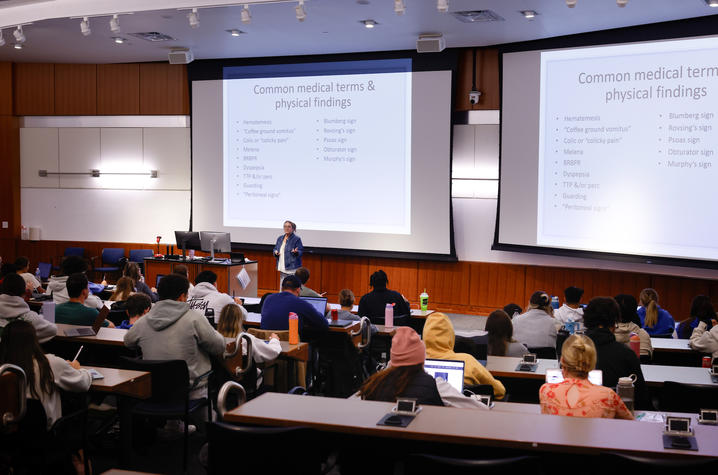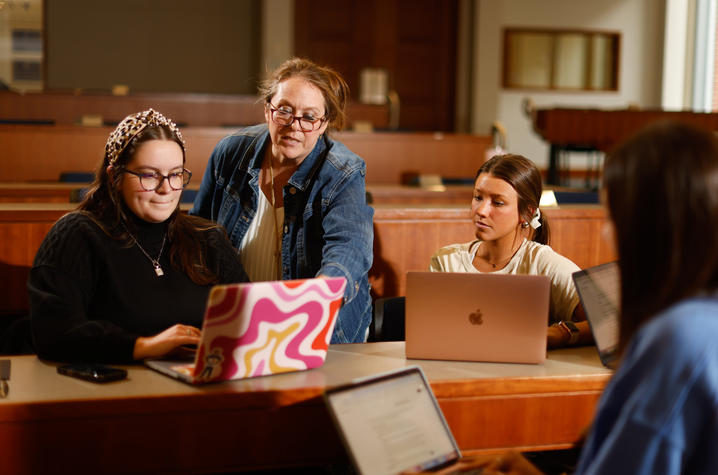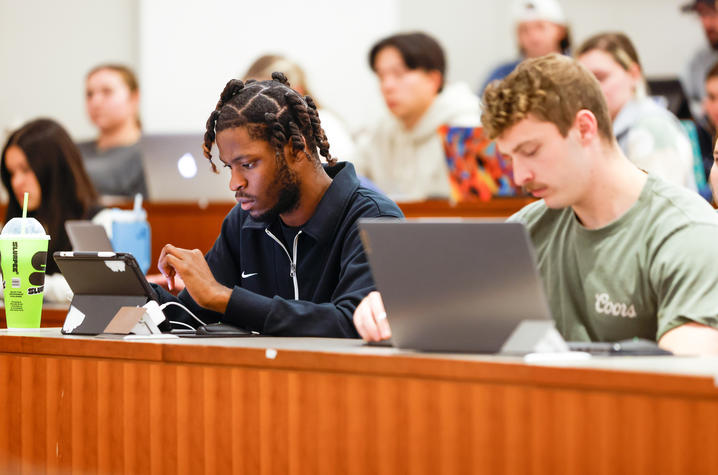ChatCOP: How AI is transforming pharmacy education
LEXINGTON, Ky. (Dec. 9, 2024) — Faculty at the University of Kentucky College of Pharmacy (UKCOP) are at the forefront of using artificial intelligence (AI) to provide an innovative and evidence-based learning experience. By embedding AI technologies like ChatGPT into various aspects of their courses, these educators are using the unique features of AI to extend their teaching abilities and foster student engagement in ways that have historically been logistically challenging.
It is not simply the use of these tools that is important, but the careful and strategic implementation that rests upon fundamental educational principles such as promoting “time on task,” retrieval-based practice, and engagement with realistic scenarios.
AI as a Learning Companion
Across several courses, AI is being used as a virtual tutor, patient or health care provider, supporting students in mastering complex problem-solving and clinical reasoning skills.
“Partially due to its widespread and free availability, AI has changed many aspects of education,” said Jeff Cain, Ed.D., vice-chair in the Department of Pharmacy Practice & Science, who uses various AI tools in his Pharmacy Management and Financial Operations course. “Used inappropriately and without thought to consequences, it could have detrimental effects on learning, and like any other tool, we should ascertain when and how it can be beneficial. It allows us to create dynamic, real-time learning environments where students can interact, explore topics more deeply, ask nuanced questions, and receive immediate feedback. This opens new teaching and learning possibilities that we haven’t had before.”
In Cain’s course, AI has allowed him to give every student the ability to practice and receive immediate feedback on sensitive conversations related to conflict management and employee discipline. Additionally, Cain has developed a virtual tutor for the course and is using NotebookLM to create short, AI-generated podcasts to summarize course material, offering students additional unique, convenient and modern methods for studying.
Similarly, Mandy Jones, Pharm.D., associate professor of pharmacy practice and science, who teaches the Differential Diagnosis in Primary Care course, uses the conversational aspects of AI as a virtual patient or health care provider to hone students’ clinical reasoning skills when addressing complex patient problems. Pharmacists’ expertise is ultimately focused on pharmacotherapy and medication management of disease. At its core, differential diagnosis or diagnostic reasoning is all about problem identification and prioritization, directly impacting medication management decision-making.
Simulated Patient and Clinical Teaching
One of the most exciting innovations involves using AI to help students practice patient interactions, especially in preparation for Objective Structured Clinical Examinations (OSCEs).
Clark Kebodeaux, Pharm.D., clinical associate professor of pharmacy practice and science, is piloting the development of AI-driven simulations to better prepare students for patient encounters.
“With AI, we’re focusing on repetition to allow students to practice and refine their clinical skills in a unique environment,” said Kebodeaux. “Ultimately, it is about helping them build confidence before they step into their OSCE exams.”
The simulations can provide feedback, allowing students to improve their communication and clinical approach. Kebodeaux is also collaborating with faculty from other institutions to test AI tools that can score OSCEs, potentially offering a more objective and streamlined evaluation process.
“This technology isn’t just about efficiency — it’s about fairness and precision,” Kebodeaux added. “AI can help provide students faster, more consistent feedback, giving them clear areas to improve upon.”
Enhancing Problem-Solving and Resource Utilization
Jones has incorporated AI-generated patient cases into her differential diagnosis course to challenge students’ critical thinking skills.
“AI helps to foster clinical reasoning skills by creating simulated patient and health care provider scenarios that mirror the real world,” Jones said. “The scenarios evolve based on student input, encouraging them to explore how a patient case might unfold in practice. This layer of realism helps students develop situational adaptability skills.”
Using very specific and carefully crafted prompts, students can have ChatGPT interact with them as a health care provider or patient as they work through solving clinical problems and generating pharmacotherapy plans. The AI’s responses are designed to encourage students to refine their diagnostic reasoning, promoting both independence and accuracy in their problem-solving skills. For example, AI-generated cases contain several “what-if” vignettes that may cause students to identify or prioritize problems differently, ultimately impacting their treatment approach.
For students to be practice-ready upon graduation, their skills must include the ability to provide written documentation suitable for a medical record and the using appropriate evidence-based resources. Jones has tasked students with comparing their clinical notes to AI-generated ones, looking for differences in organization and errors in information. For clinical notes or any other generative AI output, students must provide evidence-based, scientifically sound resources that were used to verify the accuracy of AI-generated information.
“These activities help students sharpen their skills in clinical documentation and effective resource utilization, while also teaching them to critically evaluate the role of AI in clinical decision-making,” said Jones.
Streamlining Administrative and Assessment Tasks
Beyond improving student learning, AI is transforming how faculty approach course development and assessment. Cain and Jones highlight how AI has simplified time-consuming administrative tasks such as generating exam and quiz questions, problem sets, lesson plans and outlines, ideas for in-class engagement and case discussions.
"Creating efficiencies in the behind-the-scenes aspect of teaching are the quick wins that every instructor should explore," Cain said. "This frees us to focus on the more impactful parts of teaching, such as student mentorship, providing descriptive feedback and designing a strong curriculum."
Meanwhile, Jones is experimenting with using AI to assist in grading written assignments against detailed rubrics. Though still in its early stages, this approach demonstrates AI’s potential to lighten faculty workloads while maintaining rigorous academic standards.
A New Era of Pharmacy Education
Integrating AI into the UKCOP curriculum demonstrates the faculty’s commitment to being a leader in education and health care technology. Their innovative efforts not only prepare students for the digital future of health care, but also inspire them to think creatively and critically about the role of AI in their future careers.
“AI is a rapidly changing field,” said Cain, “and we must be vigilant, ever-learning, thoughtful and forward-thinking about how it can and will affect pharmacy education and, ultimately, practice.”
In addition to using AI in the classroom, UKCOP faculty are also leading the way in scholarship pertaining to AI use in pharmacy education. They are not just using it themselves but helping the rest of the pharmacy academy understand and implement best practices.
“AI is transforming how we teach and how students learn,” said Jones. “It’s been a game-changer for sure, but it must be used appropriately. We have a responsibility to teach students about the limitations of AI and how to utilize AI tools ethically and responsibly. It’s important that students understand that AI can be inaccurate, outputs must be verified by clinical evidence, and it can never be a replacement for their own critical thinking abilities and clinical judgment.”
With AI as part of its educational innovations, the top-ranked UK College of Pharmacy is shaping a future-ready pharmacy workforce — one that embraces technology and is prepared to lead in an increasingly digital health care environment.
As the state’s flagship, land-grant institution, the University of Kentucky exists to advance the Commonwealth. We do that by preparing the next generation of leaders — placing students at the heart of everything we do — and transforming the lives of Kentuckians through education, research and creative work, service and health care. We pride ourselves on being a catalyst for breakthroughs and a force for healing, a place where ingenuity unfolds. It's all made possible by our people — visionaries, disruptors and pioneers — who make up 200 academic programs, a $476.5 million research and development enterprise and a world-class medical center, all on one campus.









